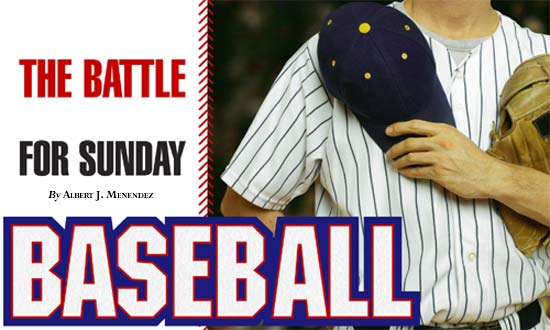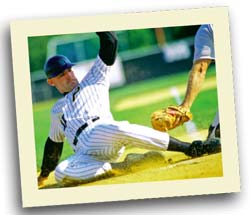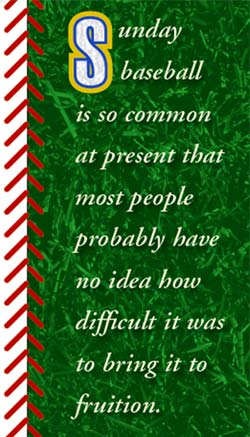The Battle for Sunday Baseball
Albert J. Menendez September/October 2007
Getting your Trinity Audio player ready...

We are now approaching the seventy-fifth anniversary of the Pennsylvania legislature's decision to lift a 140-year-old ban on Sunday sports. This finally happened in April 1933 with Sunday baseball games scheduled for 1934 in the Commonwealth. They cleared the way for all major league baseball teams to play some games on Sunday.
The struggle for Sunday baseball coincided with an intense debate over the role of religion in public life, beginning in the 1870s and continuing well into the twentieth century. Religious libertarians, who wanted a minimum of government involvement with religion and who welcomed the growing religious pluralism, battled Sabbatarians, who wanted to declare Christianity the legally established and preferred religion and who supported various strictures on activities deemed disrespectful to the Sabbath (the Sunday Sabbath, that is). The Sabbatarians, who were mostly evangelicals, were distinctly unfriendly toward the increasing numbers of Catholic, Jewish, and Eastern Orthodox immigrants, whom they saw as rivals to be subdued and marginalized.
Commercial and entertainment ventures, rooted in free market economics, had no particular brief for either religious viewpoint, but wanted to expand their enterprises. Changing attitudes toward Sunday were evolving rapidly, and the more fluid societies of the West and Midwest were open to redefining Sunday.
Baseball was, at the same time, becoming "America's National Pastime," with no serious rivals. (Football, basketball, hockey, and other games had not developed any great national following, and did not, in fact, do so until after World War II.) Gradually, beginning with St. Louis, Sunday baseball became a reality in most cities, even though the early skirmishes resulted in arrests of ball players in Cincinnati, Indianapolis, and Columbus in 1884 for "desecration of the Sabbath." Future Hall of Famers, such as Cap Anson, Mike Kelly, and Jesse Burkett, were arrested in the 1890s for playing Sunday baseball. As Charlie Bevis, the preeminent historian of Sunday baseball, noted, "Sabbatarian groups focused attention on the arrest of ball players to make their point."
1
Courts and juries refused to convict, and legislative bodies moved toward acceptance. Still, some owners were arrested, and Pennsylvania's attorney general initiated a lawsuit as late as 1926 against the Philadelphia Athletics for violating that state's Quaker-era prohibition on Sunday sports.

By the 1920s the only big-league states to resist the trend were Massachusetts and Pennsylvania, home to five of baseball's 16 teams. (New York, which had three teams, passed a Sunday baseball law in 1919, signed by Gov. Alfred E. Smith.)
Sabbatarians, led by the Lord's Day Alliance, still possessed considerable clout. They blocked Sunday baseball games played by servicemen in Philadelphia during the First World War.
Massachusetts was the next-to-last battleground. Its Republican-dominated legislature was so conservative on Sunday matters that it rejected a bill in 1922 to allow the playing of checkers and chess outdoors on Sunday.2 Public opinion demanded change. Voters petitioned a referendum on the subject for the 1928 general election. The legislature could not refuse, but it did try to "fix" the outcome by requiring that 30 percent of the total ballots cast had to be recorded in favor of allowing Sunday baseball. Since thousands of voters routinely skipped referendum questions, even while casting votes for president and Congress, this raised the threshold for approval. Opponents immediately sprang into action, led by the pastor of the Park Street Church in Boston, the largest evangelical church in New England. The opposition called itself the "SOS (Save Our Sunday) Committee," pledging defeat for any public sports activity on Sunday. Public opinion clearly favored the change, however. A large turnout on election day, far exceeding anything in Massachusetts' history, was stimulated by the presidential candidacy of Gov. Al Smith of New York, the Democratic nominee. While Smith lost in a national landslide to Herbert Hoover (largely due, historians say, to anti-Catholic religious prejudice), Smith carried the Bay State. Many new Democrats were elected to the legislature, and the Sunday baseball reform passed by a vote of 803,281 to 467,550, or 63 percent to 37 percent. It more than exceeded the 30 percent of the total vote requirement. Boston, which was the main jurisdiction affected by the law, voted yes 76 percent to 24 percent. Most other cities were supportive. Only three rural counties— Franklin in western Massachusetts, Cape Cod (Barnstable County), and the island of Martha's Vineyard (Dukes County)—rejected the change. Several rural communities and Boston suburbs were also opposed. Since it was a local option election, approval still had to come from the Boston City Council, which allowed Sunday games to start in 1929. Even then, a state law forbidding Sunday games within a thousand feet of a church forced the Boston Red Sox to play their Sunday games at Braves Field rather than at Fenway Park from 1929 to 1932, when the law was amended.
Massachusetts became the thirty-second state to authorize Sunday baseball. Of the 16 states that refused to do so at that time, seven were southern (Arkansas, Florida, Georgia, Mississippi, North Carolina, South Carolina, and Virginia), three were in the border South (Delaware, Maryland, West Virginia), three were in northern New England (Maine, New Hampshire, Vermont), and two were in the West (Iowa, South Dakota). None of these states hosted major league teams.
That left only conservative Pennsylvania, the nation's second-largest state and one noted for its legendary Republican political machine, out of sync with the rest of major league baseball. The Phillies, Athletics, and Pirates had been juggling their schedules for years because of Sunday prohibition, making their teams travel out of state on Sundays and placing them at a disadvantage with the other 13 teams. Charlie Bevis describes how this worked: "The Athletics often made the train trip to Washington to play the Senators on Sunday, with occasional one-day forays to New York to play the Yankees. The Phillies played many weekends in New York, playing the Giants at the Polo Grounds on one day and the Dodgers at Ebbets Field on the other day. The Pirates ventured from Pittsburgh frequently on one-day Sunday excursions to Cincinnati and Chicago."3

But economic, demographic, and cultural changes can cause even the most recalcitrant institutions to modify existing laws. Pennsylvanians were increasingly embarrassed by the enforcement of the law. "Because the 1794 Sunday law was still in effect in Pennsylvania, Sunday baseball games remained prohibited in the state, and thus, the law forced the fifth game of the [1929] World Series to be played one day later on Monday, October 14." 5 Polls showed overwhelming support for change among the state's electorate. The legislature finally agreed in April 1933, and the state's "Progressive" Republican Governor Gifford Pinchot signed it into law on April 25. After voter approval, it would allow Sunday games in 1934. Philadelphia voters in 1933 gave a decisive 87 percent approval. Pittsburghers were also supportive, but many rural voters preferred the old prohibition.
Pinchot, a Teddy Roosevelt-style Republican, frequently broke with his party's reactionary wing. Upon signing the bill, he said: "I am emphatically opposed to the commercialization of the Sabbath. But in a state which has Sunday trains, Sunday concerts, Sunday golf, Sunday tennis, and a host of Sunday activities of many kinds, the possible addition of baseball and football between the hours of 2:00 p.m. and 6:00 p.m., if the people of any locality vote for it, will not seriously change the present picture. For years anyone with money enough to play golf or tennis on Sunday morning or afternoon has been free to do so—law or no law. This unjust discrimination in favor of the rich and against the poor which has thus existed is one of my strongest reasons for signing this bill."6
Sunday baseball is so common at present that most people probably have no idea how difficult it was to bring it to fruition. A convergence of commercial, social, political, and religious changes was required to overcome objections that seem absurd by today's standards. Another lesson of this little saga is that proponents of change cannot—and should not—rely solely on courts to bring about advances in liberty.
Albert J. Menendez is associate director of Americans for Religious Liberty, based in Silver Spring, Maryland.
1 Charlie Bevis, Sunday Baseball: The Major Leagues' Struggle to Play Baseball on the Lord's Day, 1876-1934. (Jefferson, NC: McFarland & Company, Inc., 2003), p. 6.
2 Bevis, ibid, p. 219.
3 Bevis, ibid, p. 250.
4 Bevis, ibid, p. 288. Full text in Bevis, pp. 285-291.
5 Bevis, ibid, p. 246.
6 Quoted in Bevis, p. 257. A thorough summary of this era can be found in John A. Lucas, "The Unholy Experiment: Professional Baseball's Struggle Against Pennsylvania Sunday Blue Laws 1926-1934." Pennsylvania History, No. 38 (1971). For an overview of this issue, see David Laband and Deborah Hendry Heinbuch, Blue Laws: The History, Economics, and Politics of Sunday-Closing Laws (Lexington, Mass.: Lexington Books, 1987).